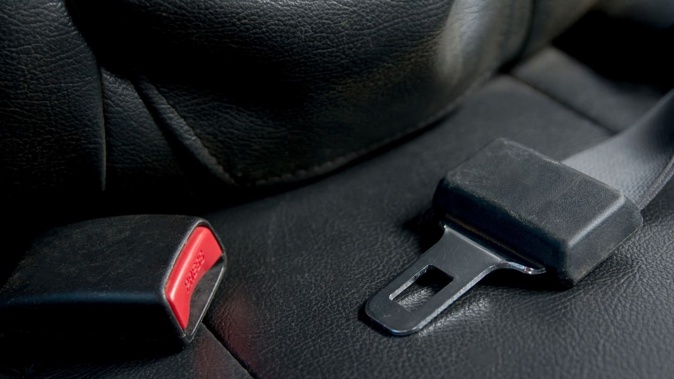

A girl restrained with a lap belt instead of being in a car seat died when her mother crashed the car after briefly taking her eyes off the road to check on her children.
Joshwyn Reihana-Ruka-Wikaira’s death has been described as an accident - one that involved avoidable errors a coroner hopes will serve as an important warning to others.
“At its heart, this is a profoundly sad situation in which a whānau has lost a 6-year-old child, cherished by many,” Coroner Ian Telford said in releasing his findings into Joshwyn’s death today.
“I am deeply mindful of the distress and grief still felt by Joshwyn’s whānau and do not wish to add to their pain and suffering. However, I believe it is important to draw every possible lesson from this highly preventable tragedy.”
The coroner said Joshwyn was in a car driven by her mother Marino Wikaira on State Highway 12, Ōmanaia, Northland about 8am on December 22, 2017.
Joshwyn was seated in the middle of the rear passenger seat with a lap-belt over her, while her sibling was correctly restrained in a car seat.
While driving 110km/h in a 100km/h zone, Wikaira briefly looked behind her to check on her children.
“When she did so, she veered off the road, then into the opposite lane. The vehicle went into the bank, span around, then came to rest against another bank.”
Joshwyn died at the scene after suffering multiple injuries.
Investigations revealed Wikaira had been drinking the night before and had gone to sleep about 1am. She had about five hours’ sleep before she drove.
Blood tests showed she had 73mg of alcohol per 100ml of blood, the legal limit is no more than 50mg.
Wikaira was also driving on a learner’s licence and had previously been reprimanded by the courts for driving while unlicensed.
In his findings, the coroner said Wikaira’s level of intoxication the morning after drinking would have impaired her ability to maintain speed, stay in her lane, and divide attention between driving and checking on her children.
Fatigue was also found to be a contributing factor and Wikaira’s quality of sleep was likely compromised by alcohol, which increased the likelihood of a crash.
 The crash occured on SH12 in Ōmanaia in the Far North. Image/Google Maps
The crash occured on SH12 in Ōmanaia in the Far North. Image/Google Maps
 Coroner Ian Telford had several important recommendations to make in his findings.
Coroner Ian Telford had several important recommendations to make in his findings.
Joshwyn’s death was also directly linked to improper restraint, which the coroner noted significantly contributed to her death.
“Joshwyn was inadequately restrained by a lap belt in the back seat. At the age of six, she should have been in a car seat. Had she been properly restrained, the injuries Joshwyn sustained in the crash may well have been survivable.”
Wikaira pleaded guilty to aggravated careless driving causing death while under the influence of alcohol or drugs and later completed alcohol and drug counselling and progressed toward a full driver’s licence.
At her sentencing in the Matariki court in Kaikohe, her deep sense of whakamā, or regret and shame, was expressed over her decision to drive that morning and was pivotal in granting her a discharge without conviction.
The coroner made several recommendations in his decision aimed at Government departments to help reduce the likelihood of similar tragedies.
“The key messages from these factors in Joshwyn’s case go beyond the usual, and still vitally important, ‘don’t drink and drive’ advice often highlighted by coroners and others such as the New Zealand Transport Agency (NZTA),“ he said.
“I also want to highlight the often overlooked and less obvious risks of driving the morning after heavy drinking.
“This includes the possibility that you might be still intoxicated, as well as the alcohol disrupting your sleep and causing fatigue. This combination of intoxication and fatigue significantly increases the danger to drivers, passengers, and other road users.”
The coroner called on NZTA and Health NZ’s health promotion unit to launch a public campaign warning of the dangers of driving the morning after drinking when residual intoxication can still impair drivers.
He also urged police to consider implementing early morning breath-testing checkpoints between 6am and 9am to catch drivers who may still be over the limit.
In addition, he recommended NZTA establish clear criteria for identifying and classifying fatigue as a road safety risk and emphasised the need for targeted interventions for drivers who breach licence conditions.
“I have consistently expressed concern about the seemingly widespread tolerance of unassessed drivers operating vehicles on our public roads.
“I therefore reiterate the recommendations made to the public in that case – which Joshwyn’s circumstances serve to highlight yet further. Before using a vehicle on public roads, take the time to get properly trained and licensed, and follow the rules. These are not just legal requirements – they are essential safeguards for your life and the lives of others.”
Agencies responded to the recommendations saying they have begun integrating key lessons into broader road safety strategies while police continue to explore targeted enforcement strategies, including morning breath testing.
Shannon Pitman is a Whangārei-based reporter for Open Justice covering courts in the Te Tai Tokerau region. She is of Ngāpuhi/ Ngāti Pūkenga descent and has worked in digital media for the past five years. She joined NZME in 2023.

Take your Radio, Podcasts and Music with you









